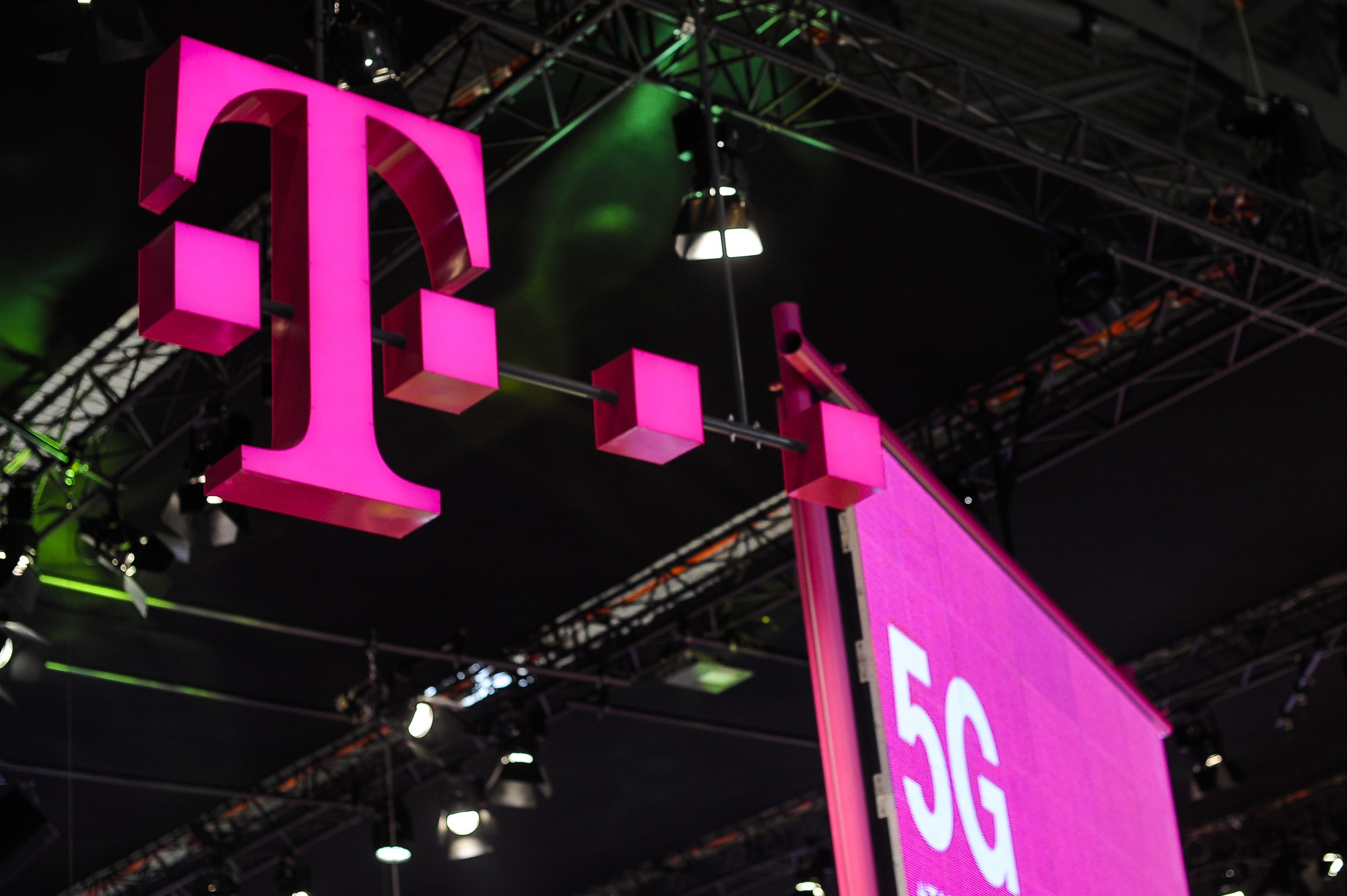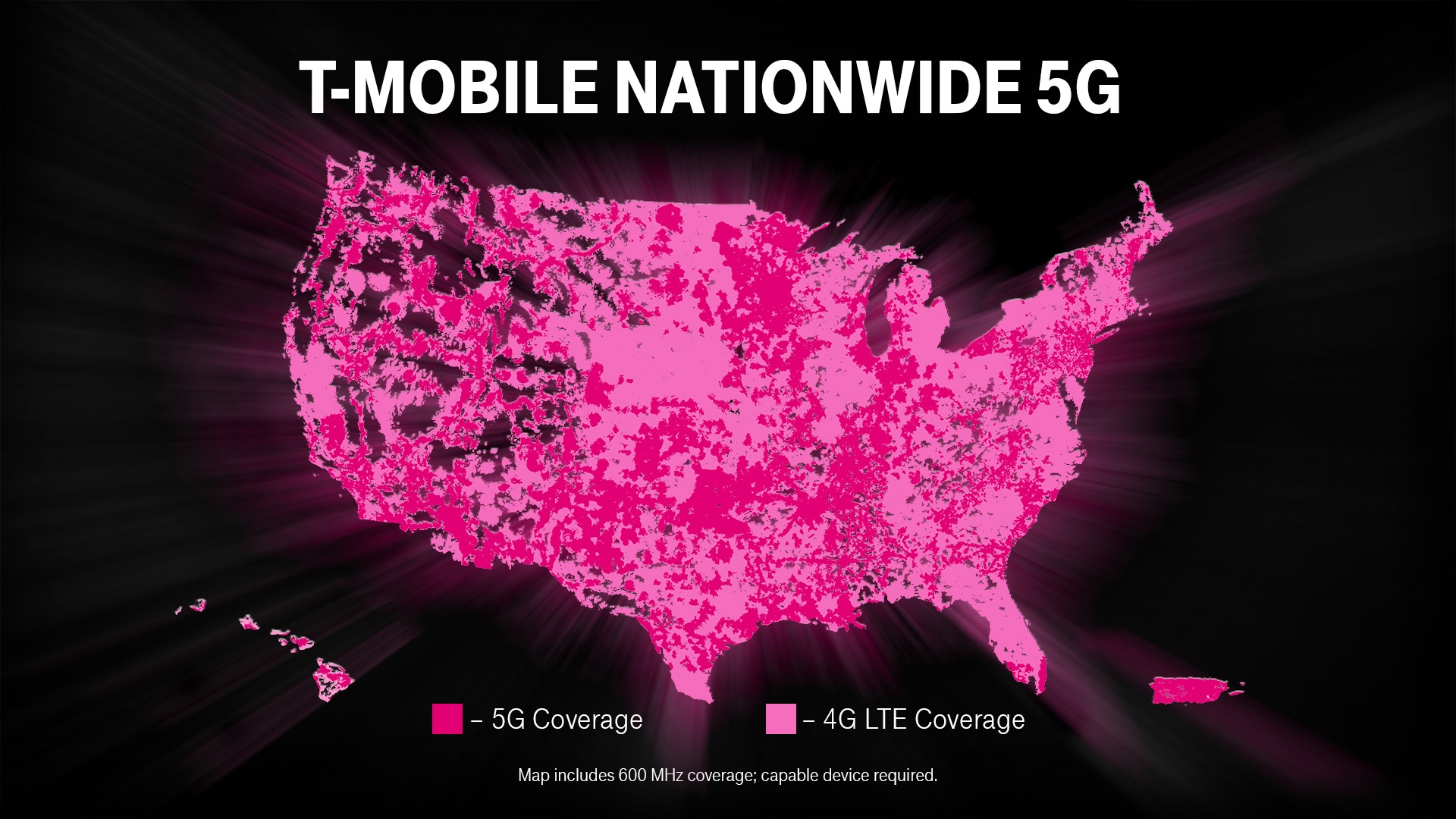T-Mobile launches nationwide 5G network: What you need to know
Coverage reaches 200 million people across the country

T-Mobile flipped the switch on a far-reaching 5G network today (Dec. 2), and it's dangling offers on discounted 5G-ready phones to tempt people to try the faster network.
Initially, T-Mobile will offer two phones that will work on the newly launched network — the Galaxy Note 10 Plus 5G from Samsung and the OnePlus 7T Pro 5G McLaren. The phones normally cost $1,299 and $899, respectively, but customers can get either one for free.
In the case of the OnePlus phone, customers who switch to T-Mobile and trade in their current phone can get OnePlus' 5G-ready device for free in the form of 24 monthly bill credits. The Note 10 Plus 5G is available for free after they buy an initial 5G-ready Note 10 and open a new line of service.
T-Mobile's promotions suggest that the carrier is eager for people to use its newly launched network, in large part because this version of 5G will be available to more people than the limited 5G rollouts other carriers — including T-Mobile itself — have unveiled thus far. T-Mobile turned on 5G service in half-a-dozen cities in June, but the network launching today can reach 5,000 cities and cover 2 million people, according to T-Mobile. And that should include rural areas which thus far have been shut out of 5G's faster speeds.
How T-Mobile's 5G network compares
The difference this time around comes down to the type of spectrum T-Mobile is using for its 5G rollout. 5G service launched in June relied upon millimeter-wave technology, which delivers fast speeds in dense areas, but can't really provide extensive coverage. T-Mobile's nationwide network is based on 600MHz spectrum — speeds won't approach the 1 Gbps threshold commonly associated with 5G, but coverage will reach more people. More importantly, 5G coverage will also work indoors with this low-band spectrum — something that's flummoxed millimeter wave-based networks up until this point.
You can expect T-Mobile, which never passes up an opportunity to tweak its competitors, to draw a contrast between its newly launched network and 5G coverage that other carriers provide. Verizon, for example, has relied on millimeter wave to bring 5G to 18 cities, as well as parts of football stadiums and hockey and basketball arenas. And while Verizon's network is fast, it's not exactly far-reaching and your signal will drop back to 4G if you lose sight of one of Verizon's 5G towers. AT&T's 5G Plus network faces similar issues in the 21 cities where it's live (though service is restricted to select customers at this point).

T-Mobile is less likely to take a dig at Sprint, since the two wireless providers are attempting to merge. (The deal has received the necessary regulatory approvals, though it faces a lawsuit from several states that goes to trial this month.) Sprint has launched its 5G network based on midrange spectrum in nine cities, delivering extended reach if slightly slower speeds than what we've seen from Verizon. T-Mobile plans to leverage that network should it complete its merger with Sprint, and it's promising that the Note 10 Plus 5G and OnePlus 7T Pro 5G McLaren will work on Sprint's network once the merger of the two carriers goes through.
Get instant access to breaking news, the hottest reviews, great deals and helpful tips.
There will soon be competition on the nationwide 5G network front. Later this month, AT&T plans to launch a more extensive 5G network of its own in five cities, with 10 more to follow shortly thereafter. As with T-Mobile's network, this AT&T network won't reach the maximum speeds of 5G, though it will offer a wider swath of coverage thanks to far-reaching low-band spectrum.
Outlook
T-Mobile may be launching its new network today, but phones capable of taking connecting to the carrier's 5G towers won't go on sale until Friday (Dec. 6). You can place pre-orders for the Galaxy Note 10 Plus 5G and OnePlus 7T Pro 5G McLaren today. If you buy the Note 10 Plus 5G in installments, you'll pay $36.12 a month for 36 months for the 6.8-inch phone with four rear cameras. The 6.67-inch OnePlus 7T 5G Pro McLaren costs $37.50 a month for 24 months.
Those two devices will just be the start for 5G-ready phones at T-Mobile. The carrier says it will add more than 15 new 5G-capable smartphones in 2020, with those handsets available at a wide range of prices. That's welcome news since up until now, 5G phones have commanded premium prices.
T-Mobile also plans to extend 5G coverage to other carriers that use its network. The company's discount Metro by T-Mobile subsidiary, which specializes in prepaid wireless service will begin to offer 5G coverage later this month.
5G coverage at T-Mobile won't add anything to your monthly cell phone bill. Access to the faster network will be included with T-Mobile's $70-a-month unlimited plan. Verizon charges $10 extra a month on top of its regular unlimited data plans, though it's currently waving that fee on three of the four unlimited options.
Philip Michaels is a Managing Editor at Tom's Guide. He's been covering personal technology since 1999 and was in the building when Steve Jobs showed off the iPhone for the first time. He's been evaluating smartphones since that first iPhone debuted in 2007, and he's been following phone carriers and smartphone plans since 2015. He has strong opinions about Apple, the Oakland Athletics, old movies and proper butchery techniques. Follow him at @PhilipMichaels.
 Club Benefits
Club Benefits






